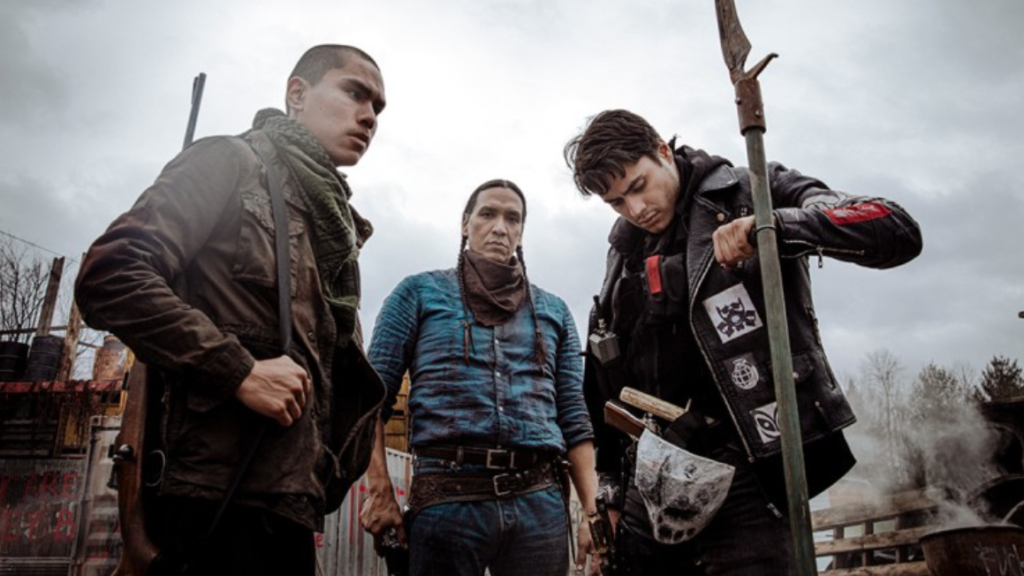Blood quantum
2019

Rated: R
Genre: Horror
Country: Canada
Run-Time: 1h 36min
Director: Jeff Barnaby
Cast
Michael Greyeyes…………………..Traylor
Forrest Goodluck……………………Joseph
Kiowa Gordon…………………………..Lysol
Elle-Máijá Tailfeathers…………..Joss
Part of my fascination with modern horror is how often it is used as the genre of choice for underrepresented people looking to find a voice in film. You just need to take a quick scan of films listed in The Midnight Selections to see just how inclusive horror has been. The likely reasons for this are obvious. It is a genre that always strives at innovation, which appeals to young talented directors of all backgrounds. A huge budget is not necessarily a requirement to make a horror film successful. There is an established fan base that doesn’t always agree, but is for the most part fairly accommodating and open-minded. Plus, every culture has passed down tales of their own ghouls, or, if desired, more mainstream evils can be repurposed to suit the needs of a particular story.
This last point is the approach Jeff Barnaby had taken when crafting Blood Quantum, his distinctively First Nations take on the zombie apocalypse sub-genre.
Blood Quantum is a film about two delinquent brothers, Joseph and “Lysol”, who both find themselves at odds with their father, Traylor, for different reasons. The film starts with Traylor, the Red Crow Reservation’s Sheriff, being called to bail his sons out of a holding cell in the city. But first, Traylor responds to an urgent call from his father after he finds the salmon he gutted continue to jump as though they are still somehow alive. (Yes, they are zombie salmon.)
Blood Quantum takes place in two separate timelines, one in which we see the beginnings of the zombie apocalypse and a second where we fast-forward six months later to learn that those with Mi’gmag blood are immune to infection. Joseph, the film’s central character, is divided. On one hand he wants to spend time with his older brother, “Lysol”, who is a self-proclaimed “asshole” that enjoys getting into juvenile trouble. On the other hand, Joseph is an expected father. He accidently knocked-up his white, teenage girlfriend before the zombie apocalypse began and is beginning to accept the consequences. He also sees the leadership roles that Traylor, his mother and his grandfather have taken to make the community better and wants to do right by them.
But the brothers are also caught on different sides of a larger philosophical divide between the Mi’gmag people as to what to do with the white survivors they have been protecting. Some see saving them as the humane way to move forward, while others, fostered by generations of distrust, look at them as only zombies in-waiting and a strain on their resources. They feel Mother Earth has spoken and their community would be better off without them. Undoubtedly, this reversal of fortunes makes a rather poignant point about the attitudes, both past and present, of colonizers.
In the same vein as George A. Romero, director Jeff Barnaby uses his zombie film as a vehicle for social commentary, both through the plot and in the gory images he conjures. It is not hard to see how a First Nation’s man being torn apart by a group of all white zombies acts as a metaphor for our colonial past. Or to see how grandpa wielding his sword like a samurai, cutting down white zombie after white zombie, could be seen as an act of catharsis for a culture that has been repeatedly abused. Even the film’s title is a reference to a controversial test used by the government to identify how much “Indian blood” a person may have as a means of restricting citizenship into a tribe.
But much of Blood Quantum’s impressive social commentary lies in the periphery of a main story that shows a struggling father’s attempt to maintain some semblance of community for his two sons, even though one seems, perhaps, beyond the point of redemption. This core story is universal and, like most zombie films, deals with themes of survival, selfishness and sacrifice.
Although Barnaby does give us a glimpse at what a First Nation’s action hero looks like- after all, the grandfather and a minor character named Bumper both are pretty badass- he does not go out of his way to idealize the Mi’gmag people, nor does he disproportionally demonize the white characters who are not infected. The situation gives the Mi’gmag people power, but there are those in the tribe who exploit it. Drugs and alcohol seem to be regularly used to excess by many of the Mi’gmag characters. Traylor clearly failed as a father to Lysol by not being there enough, especially after his mother passed away. And Joseph’s white girlfriend stands out as one of the bravest, most grounded characters within the entire film. Barnaby’s greater message seems to be that despite culture, we are one people and need to treat each other with honesty and respect if we ever are to reconcile and move forward. When the Mi’gmag and the white characters do this, the community thrives. When individuals on either or both sides stop, the situation quickly devolves.
Zombie films are very divisive amongst fans, but people keep making them, so clearly the audience is still there. Blood Quantum was well reviewed and has gained many strong advocates; however, it has faced its fair share of criticism by zombie genre fans as well. After a little online research, it appears that the film’s detractors are evenly undecided on whether the social commentary goes too far or not far enough. That is obviously a battle that Barnaby, or any other director, is not going to win. Others feel that the film could have had more originality to the plot, but to be fair, this now is a common criticism of every zombie film. (You can blame it on a few too many seasons of The Walking Dead and its many spin-offs) Then, there are those who feel some of the characters needed more time to develop. But I, personally, did not find that true in Barnaby’s tale of three generations of Mi’gmag men who accept their fate during a zombie apocalypse. Sure, screen time seems rather limited for Joseph, which seems odd given his importance to the main plot. But when I viewed the film, I felt his character was also represented by the actions of others. His Grandfather, father and brother represent all of his possible paths. They all are who he possibly could become or, as they each seem to hope, maybe he could be even better. There is something beautiful in this idea.
Simply put, there is a good deal to admire about this gory, post-apocalyptic Mi’gmag film. I look forward to the next horrific tale Barnaby wishes to tell.
